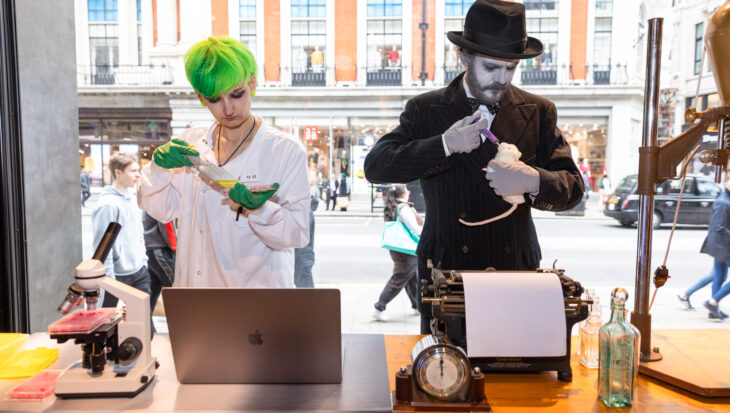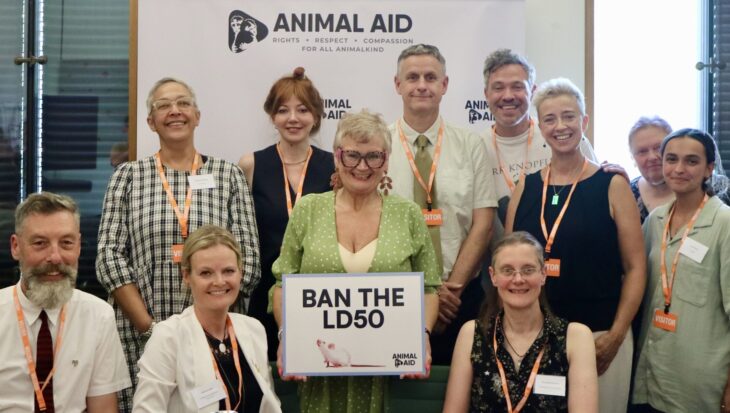25 September 2000
Dear Sir Stuart
I write to advise you formally that Animal Aid is adding its voice to the campaign to persuade John Lewis to end its involvement in the pheasant shooting industry.
Animal Aid is the largest animal rights campaigning organisation in the country with thousands of supporters. On 7 October, peaceful demonstrations will take place across the country at which time John Lewis customers will be informed of your company’s active involvement in this bloodsport. Thousands of posters and leaflets have been produced for this purpose and further demonstrations are planned for the subsequent months.
I would urge you to reconsider your involvement in this squalid bloodsport and must assure you of our determination to continue with our campaign until the rearing and shooting of pheasants at your Hampshire estate ceases.
Yours sincerely
Andrew Tyler
Director
Animal Aid
(Video and report mailed separately)
5 October 2000
Dear Mr Tyler
Thank you for your two letters dated 25 September, with the second you enclosed a copy of your organisation’s video about pheasant shooting.
I fully respect the sincerity of the views which you hold, but may I make just two points:
… First, shooting is an entirely lawful activity. The small shoot which takes place on our farming estate is an established part of country life, as it is in many parts of the UK. As you feel so strongly surely your focus should be on seeking a change in the law?
… Secondly, contrary to the impression given in your literature, we follow the highest standards in the way this activity is managed, and, more widely, our success in sensitively safeguarding an area of countryside of special scientific interest has been recognised by the major conservation bodies.
I note your intention to demonstrate outside our shops on Saturday and also acknowledge your statement that the demonstration last week at Southampton was entirely peaceful.
Finally, although you claim thousands of supporters I also note that your organisation opposes fishing of all kinds, advocates not eating any animal products at all, including dairy products, and recommends not wearing wool, silk and leather. It seems to me from simple observation that there is only a very tiny minority of people supporting this agenda.
Yours sincerely
Stuart Hampson
Chairman
John Lewis Partnership
10 October 2000
Dear Sir Stuart
Thank you for your October 5 letter.
In response to your first point, we are pressing for a change in the laws governing shooting, not least the archaic Game Acts, which give unparalleled powers to gamekeepers.
In response to your second point, the shed-rearing of pheasants on the Leckford estate so that they can be shot for sport; fitting them with beak clips and plastic blinkers; and destroying stoats, weasels and foxes to protect this ‘sport’ have all been admitted to by your press spokesman. Such practices do not indicate a ‘sensitive’ regard for the countryside. The fact that ‘major conservation bodies’ feel it necessary to voice support for the modern pheasant rearing and shooting industry simply indicates: a) how far removed certain bodies seem to have become from a proper and respectful regard for the countryside and its indigenous inhabitants; b) the power of big landowners and agribusinesses over such organisations.
Incidentally, a letter being sent out by your press and public relations department claims that the Leckford pheasants are ‘free to roam over many acres of bird cover’. This might be the case prior to their final release before being shot, but the statement omits to make clear that the birds are initially shed-reared and fitted with painful behaviour-control devices. Wouldn’t you say that the public is being misled by such statements?
The letter also asserts that the shooting parties are not ‘corporate’ events but ‘organised by and for employees’. We are aware, however, that the estate plays host to bird shoots for non-Partnership visitors.
You end by noting that we oppose the cruelty of the dairy and animal skin trades and imply that, because we take this view, our campaign against pheasant shooting can therefore have little public support. This is a non sequitur – and, what’s more, a serious misjudgement. The public response to our campaign has been overwhelmingly supportive. We shall be endeavouring to marshal that support in the weeks and months to come.
I note that you failed to respond to the general contents of our report and undercover film, but rather seemed to suggest that pheasant rearing and shooting on the Partnership’s estate is a separate case. Is that your argument? Or do you defend the way the pheasant shooting industry in Britain generally goes about its business?
I would appreciate hearing from you on these questions.
Yours sincerely
Andrew Tyler
Director
Animal Aid
17 October 2000
Dear Mr Tyler
I am sorry that you feel that our statements about the Estate could be misleading. With regard to pheasants being ‘free to roam over many acres of bird cover’, of course, they are kept in sheds for a few weeks after they are hatched, as otherwise they wouldn’t survive. In the same way free-range chickens spend some time in covered conditions until they have sufficient feather cover to be released, and newly born calves also are generally given similar protection before being put out to grass. To suggest that this kind of statement is misleading is simply to show no knowledge of animal husbandry. As for ‘painful behaviour control devices’, I presume you are referring to the biodegradable plastic beak shields (known sometimes as bits) which are used to stop young pheasant birds feather-pecking each other from about 2-3 weeks until released into woodland. We give the young birds plenty of room, but their natural behaviour would still include feather-pecking – which would be pretty painful as well!
To clarify the position about shooting by non-partners, these are not corporate entertainment in any way. As is the case on many farms, we let out a number of days at a commercial rate in order to create income to offset the costs of the gamekeeper’s department. There is no trading link between those who take up those days and the Partnership.
I have no comment to make on your report and video. I respect your right to seek support for your views, but the Partnership has no wish to take an active part in such a debate.
Yours sincerely
Stuart Hampson
Chairman
John Lewis Partnership
19 October 2000
Dear Sir Stuart
Thank you for your October 17 letter. I feel I must reply to some of the points you raised.
You state that the birds are initially shed-reared ‘otherwise they wouldn’t survive’. This implies a degree of constructive altruism on your part, when – in reality – the birds are being raised in unnaturally large numbers for the purpose of being subsequently shot for pleasure.
Wild birds do not need sheds. Nor do they need painful beak clips and plastic blinkers. That’s because pheasants living in the wild do not indulge in large-scale feather pecking or cannibalism – behaviours which are directly attributable to the crowded, unnatural conditions in the sheds and release pens.
You say my letter indicated that I have ‘no knowledge of animal husbandry’. Yet you go on to demonstrate your own profound detachment from the realities of animal production.
Free-range chickens, you state, ‘spend some time in covered conditions’ before being released – conjuring up a picture of a small number of birds scratching around in a yard. In fact, the typical commercial ‘free range’ unit houses several thousand birds in each shed, with pop holes for the birds to come and go when the weather is suitable. They spend a great deal of time in their crowded units and they remain densely stocked when in the surrounding grounds. Such ‘free range’ birds suffer high levels of early mortality precisely because of the particular stresses of a system that pretends to be what it isn’t.
You allude also to the ‘protection’ given newly born calves. Are you not aware that most calves born to dairy animals are taken from their mothers within 48 hours and, being a waste by-product of the milk industry, are treated with anything but genuine consideration? Every year, hundreds of thousands were destroyed within weeks of birth under the recently defunct calf processing scheme. We have film of animals just a few days old being bartered for a few pounds in livestock markets – being shoved and cuffed and dragged by their tails.
These abuses persist thanks to the continuing over-production of milk – and the inherent cruelties of the modern dairy industry.
Calves born to beef animals typically spend their early months in cramped, dung-covered sheds (depending on when they are born). We have observed, filmed and tracked many such animals – from gestation to fattening and slaughter. We know a good deal about this and other livestock sectors and are committed to bringing the facts before the public.
I would urge you not to assume ignorance on our part.
Finally, let me return to pheasants. There is the suggestion in some of your company statements that the decision by certain staff to go shooting is theirs and theirs alone; the company is, in effect, passively on the sidelines. This position is untenable. The company, on its own estate, rears the birds, organises the shoots (for staff and outsiders) and employs gamekeepers to kill animals who threaten the ‘sport’. In other words, the company facilitates rather than passively observes.
We are aware already that a large number of your staff are unhappy with the company’s pheasant shooting activities. We are urging them to make their feelings known to management, given that the practice taints the reputation of the Partnership as a whole.
Yours sincerely
Andrew Tyler
Director
Animal Aid

